Chapter 3: Making an Entrance
The newcomer from Satamia in Nebador strode quickly down the grassy hill toward the little cart-road that wound among the farms and cottages. His footsteps brought curious glances from windows and gardens, and to each he smiled and waved. Some waved back, especially the children. Others watched him cautiously.
The road zigzagged between newly-planted gardens, budding orchards, and freshly-tilled fields. As the newcomer reached the last cottage, a young farmer with curly brown hair pushed a cart of old yellow hay onto the road.
“T’sa rat boful di, es’nut?” the lad asked cheerfully.
The newcomer stood silently, his face showing embarrassment. After a few moments of mental effort, he pointed to his ears and made a waving motion with his hands. Then, with palms open, he bowed slightly.
“Oo-kee, g’di t’ya.” The young farmer pushed his load of hay toward another farm, the cart’s wooden wheels creaking as they turned.
The newcomer stood thoughtfully for a moment, then dug some small silver coins out of his shoulder bag and put them in an outside pocket. He filled his lungs with the cool air, and continued walking toward the walled city.
With every step up the gentle slope toward the city, more and more of the countryside came into view. The cart road from the farming vale was the
NEBADOR Book One: The Test 11
smallest of the ways that came together at the city gate. Two roads from the north and one from the west brought people, horses, and wagons. More farms lay along the northward roads, with dark forests and white peaks on the horizon. The road from the west emerged from gentle green hills.
When the newcomer came to the meeting of the ways just outside the gate, he paused. An old priest on horseback turned toward the city from the westward road.
The mare stopped walking and turned her head to look at the strange human standing beside the road. She breathed deeply to catch his scent.
The newcomer’s gaze met one of the mare’s black, sparkling eyes, and they both stood transfixed for a moment.
Finally the priest spurred on his horse, and the newcomer had to blink away a moment of sadness.
A little cart brimming with leafy vegetables, pulled by a farmer and his wife, labored slowly up the road from the north. The newcomer stepped in between the horse and the handcart. As he listened to the words spoken at the gate between the guards and those arriving, a slight smile came to him.
When the horse and rider passed through, the newcomer glimpsed the coin that changed hands.
The guards looked at him. “Ye thar! From whence ‘n’ t’whither?”
“I come here to hire companions for the purpose of making a long journey,” he replied, choosing his words carefully. “If you please, direct me to an inn of good quality.” He tossed a small silver piece to the guard who had spoken.
The guard caught the coin, squinted at the stranger for a moment, then waved him in, saying, “Hard be t’marchet.”
As soon as the newcomer put a few paces between himself and the gate, a long sigh of relief escaped him. He looked around the open area just inside the city walls and saw dozens of people going about their business, four-footed animals tied to posts, wooden buildings two or three stories high with thatched roofs, and little muddy streets going off in several directions.
“Marchet . . . marchet . . .” he mumbled to himself as he picked one of the streets and began to follow it.
NEBADOR Book One: The Test 12
Deep Learning Notes
As anyone who has learned a foreign language knows, classroom study does not prepare a person for the reality of speaking the language in everyday life.
The local farmer’s words are English, believe it or not: “It is a right beautiful day, is it not?” and “Okay, good day to you.”
The gate guards have great power because it is the only way into the city. Not knowing the customs and arriving without the proper coin for a bribe might have consequences greater than just being turned away.
The people could understand Ilika’s words long before he could understand them. Can you guess why?
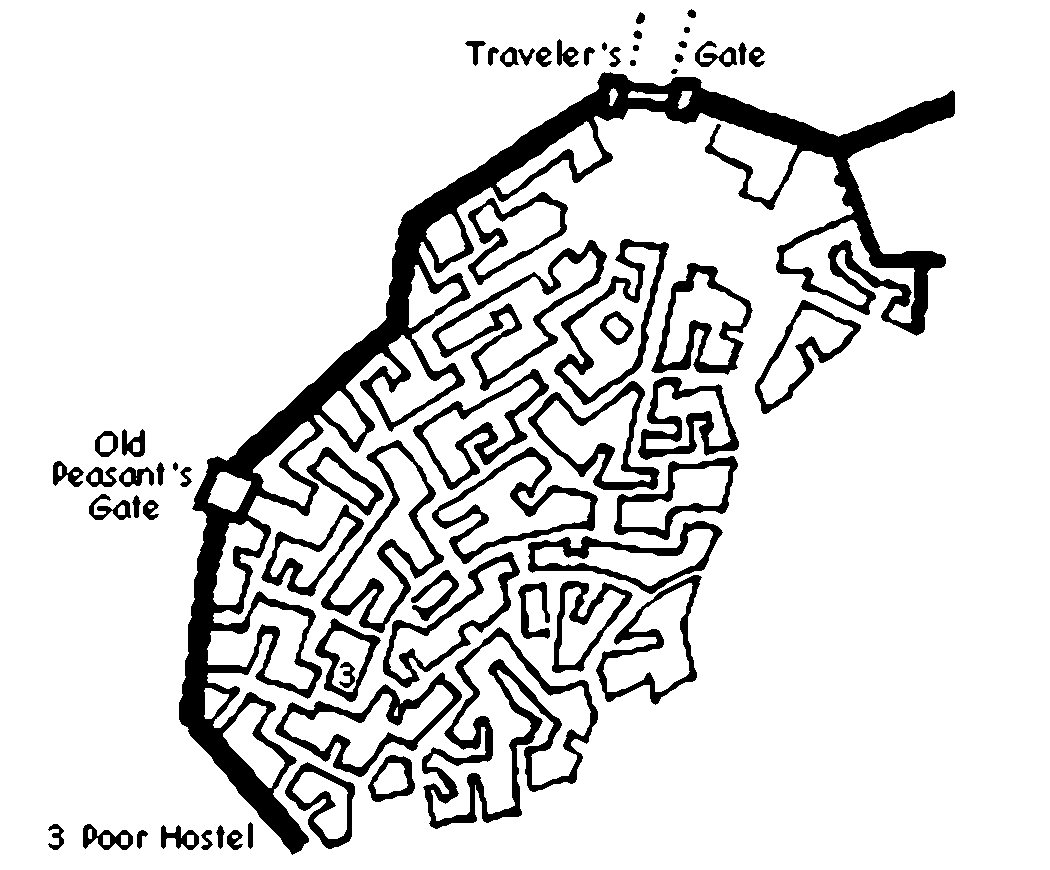
NEBADOR Book One: The Test 13
Chapter 4: The City and Its Ways
The young man from somewhere far away began to wander the narrow streets of Rumble Town, crowded with people and carts, and nearly impassable when a wagon broke an axle, or a frightened animal refused to move. On foot and lightly burdened, he found ways around, until faced with a tangle of confused sheep and frustrated people that completely filled the street. A group of children carrying baskets quickly veered toward an alleyway. At the same time, the sound of yelling guards approached from behind. One of the children paused beside a stack of old barrels and looked back at the stranger.
“Git’y on, oh ye be a’slavin’!”
The newcomer heard the key word in the lad’s phrase, and on quick feet followed the children into an alley that appeared to go nowhere. After squeezing through a narrow passage between two buildings, they all emerged into another street and the children dashed away.
The newcomer looked for written signs, but found no help navigating the featureless maze of winding streets. The ringing sound of metal came from a wide door with an old hammer mounted above. Over another door, a bundle of wheat dangled from a stick, and a man emerged with a sack of grain on his
NEBADOR Book One: The Test 14
shoulder. A family with hungry looks in their eyes, clutching small coins, entered a doorway marked with an old ceramic plate.
On nearly every street, well-dressed merchants prodded their slaves, and the newcomer cringed as he watched the forced laborers, dressed in rags, staggering under their burdens.
Smells assaulted his nose from every direction. The aroma of animal manure was ever-present, but tolerable. When he came upon the heavy odor of human waste, or the fumes from a smoldering trash fire, he moved away quickly and found something to hold while his stomach settled.
Eventually he came to a hostel that housed its guests in crowded bunkrooms. The only food was lumpy mush. Insects and rodents fought each other for any unattended bit. A sour smell filled the entire building.
The scruffy man stirring a cooking pot looked the newcomer up and down.
“Ye need a’hire di strong mans? I ring . . .”
Glancing around, the newcomer saw some of the guests quickly lacing up their boots or slicking back their hair. “I am . . . just looking for an inn.”
The scruffy man frowned and turned back to his cooking pot.
By now, the newcomer’s biggest problem was painfully obvious to him.
Having learned the language in classrooms, he could read it, but none of the signs he had seen used words. He could speak it slowly and carefully, but had no experience hearing it in real life.
He clenched his jaw with determination, and from that point on, stopped and pretended to look at something whenever he heard people talking. Then, after they continued on their way, he said the words softly to himself until a smile of understanding came to him. As the hours passed, he began to carry himself with more confidence.
With the approach of mid-day, the desire for something tasty and nutritious made him turn his feet eastward, toward the parts of the city he had not yet explored. He soon came upon a large open plaza with hundreds of people buying and selling in a maze of carts and wagons. The delicious aroma of baking bread made his mouth water. He grinned when he caught the sweet scent of ripe fruit. The odor of raw meat sitting in the sun, however, made him quickly change direction.
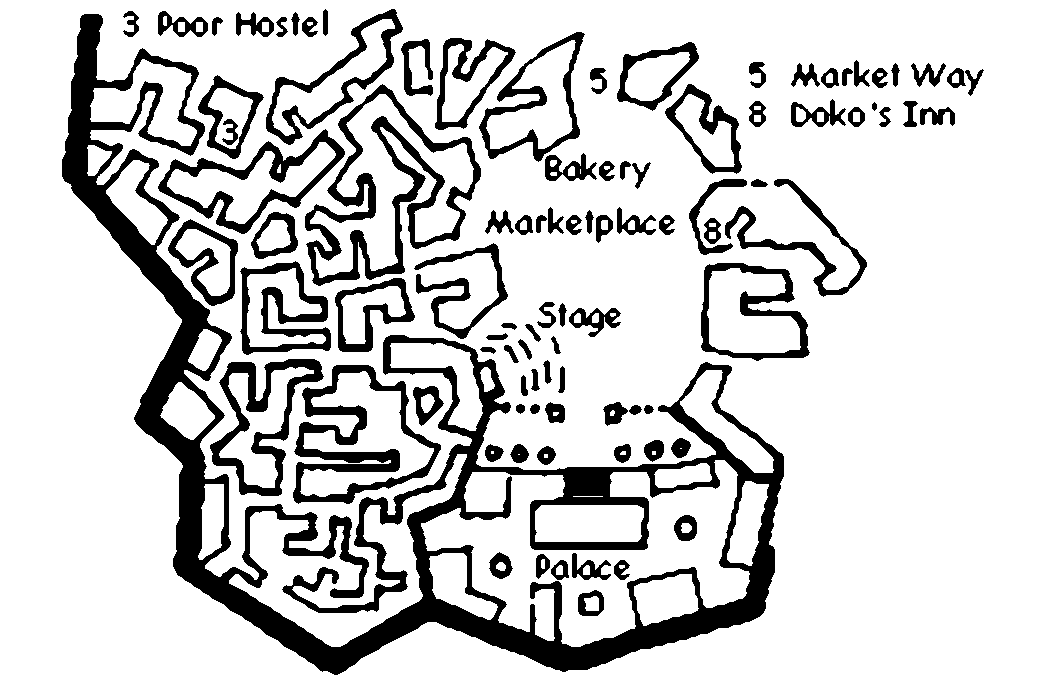
NEBADOR Book One: The Test 15
The marketplace filled the northern half of the plaza, and beyond was an open area where men stood talking, women sat on benches, and children played with simple toys. Colorful banners decorated a wooden performing stage, currently empty. At the southern end of the plaza, beyond a low stone wall, lay the palace courtyard with its cleanly-swept stone paving, marble statues, and uniformed guards.
The newcomer let his feet wander through the market, but whenever he heard an argument brewing or noticed a thief at work, he made himself scarce. All the while, he continued to listen to the language as spoken by the people.
Shops and other businesses surrounded the plaza. Wooden signs with words, often hanging from fancy ironwork, brought a smile to the newcomer.
He quickly spotted an inn, and perhaps another closer to the bakery.
The first inn, near the palace, was covered with finery from floor to ceiling, wall to wall. A well-dressed man at the door asked his title. The newcomer bowed slightly and departed.
At the next inn, a fire crackled in the common room fireplace, and some merchants and their families sat at tables eating a meal. The newcomer smiled.
Doko, the large and friendly innkeeper, was able to communicate with Ilika of Satamia without much trouble. Many slurs and contractions still
NEBADOR Book One: The Test 16
made the young man pause, but the innkeeper sensed when his words had not been understood, and rephrased.
When Doko learned his new guest would be staying for an entire week, he gave the young man a complete tour. Sturdy logs and heavy lumber gave the building a feeling of strength. A corridor separated the quiet common room from the kitchen and reception desk, and at the back of the building, stairs ascended to the upper floors. The innkeeper’s plump wife, shy teenage son, and slightly younger bright-eyed daughter, each greeted the new guest, then returned to their work.
Following the innkeeper, Ilika entered a cozy room on the second level, completely paneled with rough boards and roofed with logs. A small window overlooked the plaza. He nodded and dug out five silver pieces to pay for a week’s lodging and meals.
“You must understand, Liko,” the innkeeper explained, “wine and desserts are not included with basic board.”
Ilika ignored the failed attempt at his name, and assured Doko that he understood.
Alone at last, shoulder bag on the small wooden table, Ilika stretched out on the bed. Feeling strange lumps in the mattress, he quickly sat back up.
After poking at them to make sure they were nothing alive — or dead — he lay back down and laughed aloud at himself.
Mosa, the innkeeper’s wife, nodded when Ilika explained he ate no red meat, but she burst into a rant when he asked if he could drink fruit juice instead of ale or wine. He soon got the message that basic board did not include special requests. She fell silent when he humbly offered an extra copper piece, and she received it with a grin.
The innkeeper’s stocky daughter of ten or eleven years was immediately sent into the marketplace. Ilika soon received a plate of fresh bread, strong cheese, cooked vegetables, and a few minutes later, a mug of freshly-squeezed fruit juice. Seeing the girl shuffle her feet, he brought out another copper piece. Her smile was almost as sweet as the juice.
After eating, Ilika stepped back into the sounds and smells of the
NEBADOR Book One: The Test 17
marketplace. The array of wagons and carts aroused his curiosity.
Spring vegetables filled countless wooden crates. Round cheeses, kept cool with wet cloth, slowly disappeared into shopping baskets. Early fruits overflowed large wooden bowls, and colorful candies nestled in smaller bowls.
Wood and iron tools dangled from the sides of wagons, while ceramic plates and mugs rattled as customers examined them.
Catching a whiff of something sweet, Ilika followed the scent to the bakery on the edge of the plaza, and discovered a tray of fruit tarts just out of the oven. He recognized the word “berry” in the baker’s words, then discovered that his smallest coin netted him three of the little pastries. He looked around.
A young boy and slightly older girl, very poor by their clothing, sat side-by-side on one end of a log. Ilika sat down on the other end. Soon they were stealing glances at his uneaten tarts.
“I have a problem,” he said without looking at them. “I have two more tarts than I need. I wonder if anyone around here would like a tart . . .”
“Yaeg’d sir! We’drilly wantum g’d sir!” the girl announced with sparkling eyes and a grin.
Although Ilika could not follow the girl’s rapid speech, her smile communicated the meaning clearly. “Okay, one for each of you.”
The three sat in silence, enjoying their berry tarts. The children seemed determined to savor theirs for as long as possible, not letting any crumb escape.
Suddenly both children were grabbed from behind and lifted off the ground by a man dressed the same. The tarts went flying into the dirt, and the children cried as the man yelled at them.
Ilika listened carefully, heard the word “thief” several times, and rose to face the irate parent. “I gave them the tarts,” he interrupted with the sternest voice he could muster while making solid eye contact.
The father fell silent but didn’t release his children.
“I had too many and shared them with these children in exchange for a place to sit,” Ilika added.
The embarrassed father struggled to collect himself as people gathered to watch the drama. After a few moments, he released the children, still
NEBADOR Book One: The Test 18
shedding tears. With a huff, he picked up his bundle and began striding toward the city gate. The crowd parted for him. After several paces, he barked a command without looking back, and the crying children scurried after.
With a heavy heart Ilika turned to find dogs devouring the dropped tarts and the baker standing near, flour-covered hands on his hips. “T’ems ony tarts his child’n see all yer long.”
Ilika understood enough words to gather the baker’s meaning. He looked at the faces of the people around him, sensing only sympathy for the children.
After thanking the baker for his kind words, Ilika made his way thoughtfully back to the solitude of his little room at the inn.
Deep Learning Notes
The map shows the northwestern part of the city. By picking a street randomly, and obviously missing Market Way, Ilika was plunged into the poorest part of town.
Understanding a new language usually begins with picking out key words. In the phrase “Git’y on, oh ye be a’slavin’!” what key word did Ilika spot?
Ilika noticed three businesses with symbolic signs: a hammer, a bundle of wheat, and a plate. What were those businesses?
When the cook in the poor hostel looked Ilika “up and down,” what did he see that made him think Ilika was there to hire workers?
The map of the southwestern part of the city shows its relationship to the marketplace, where Ilika finally discovered lodging and food he could tolerate.
Why were there signs with words in the marketplace, when there had been none in the western part of the city? Hint: they were often hanging from fancy ironwork.
NEBADOR Book One: The Test 19
Why did Ilika leave the first inn when asked his title? It appeared to be better than the one he chose.
A point of writing craft. The main character shared his name with the rabbit in chapter 1, but remained “the young man.” When he began to move among people, he became “the newcomer.” He only became “Ilika” in the narrative when he began to relate to the innkeeper. What effect does this (hopefully) have on the reader?
Gift-giving is very tricky in most cultures, and misunderstandings happen easily. People often consider a gift from a stranger to be demeaning charity.
Could Ilika, or the father, have done anything to avoid the bad feelings at the end of this chapter?
NEBADOR Book One: The Test 20
Chapter 5: The Best and the Worst
For the next four days, Ilika continued to wander the marketplace and the muddy streets and alleys of Rumble Town. Although deeply saddened by the poverty and forced labor all around him, he continued to practice his language skills at every opportunity. At each street vendor and shop, he found a reason to linger or go in, even if just to ask a question.
Braving the insects and odors, he made himself sample the working-class food. Only once did his stomach revolt, forcing him to stay in his room sipping water and nibbling dry bread for the rest of the day.
With the dawning of a new sunny day, Ilika made sure he was nicely dressed and began carefully exploring the eastern part of the city. Behind real glass windows, little shops displayed everything a gentleman or a lady could want. The sturdy half-timber houses of Cobble Town were larger, the streets wider and always paved with fitted stones. Walls and dogs protected gardens and patios, both completely unknown in Rumble Town.
No trash or unpleasant odors were allowed. Teams of slaves, supervised by guards, worked constantly to clean up animal droppings and anything else unpleasant.
Cobble Town held one delight the poorer section of the city lacked. Ilika’s eyes sparkled every time he heard the simple tunes created by the drums and pipes of street musicians. At other times he would overhear well-dressed children talking about the location of the nearest jester. Following, he too
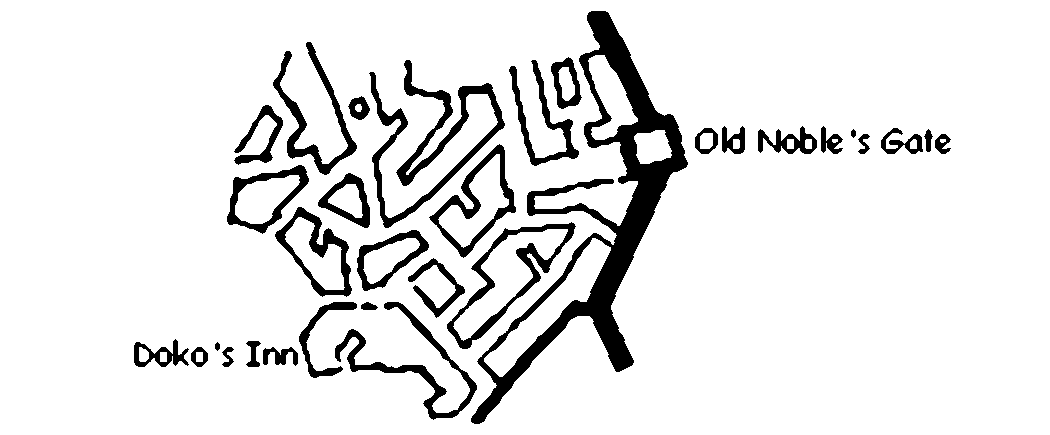
NEBADOR Book One: The Test 21
would grin from ear to ear at the juggling, acrobatics, or silent pantomime.
But the entertainment was only for the wealthy residents of the area. Ilika saw peasants quickly arrested and hauled away when caught without a clear purpose or an escort.
On his second day exploring the richer part of the city, Ilika looked carefully at the street signs, carved in block letters but often misspelled. From Doko’s Inn, Jewelers Wey led to Heelers Row. From there, Scrib Street branched, unless Ilika got lost on Murchants Circle, which he did, twice.
The guild halls and shops of the upper-class professions lined every street.
Scribes, accountants, and illustrators seemed to be common. Jewelers and money changers were fewer and always well-guarded. With a frown, Ilika looked askance at the forceps and other crude surgical instruments dangling in the windows of healers.
As mid-day approached, he found an eatery near the old Noble’s Gate and relaxed with a bowl of spicy fish soup, fresh bread, and cheese. Around him at other tables sat merchants, workshop owners, and scribes, all discussing business deals, the unreliability of the laborers they grudgingly paid, and the worthlessness of most slaves.
A heavy rain began pounding the streets, so Ilika joined the many customers who ordered custard to prolong their meal.
Eventually, when the rain lightened, he wandered back to his inn to think about all he had seen, and arrange for a relaxing warm bath.
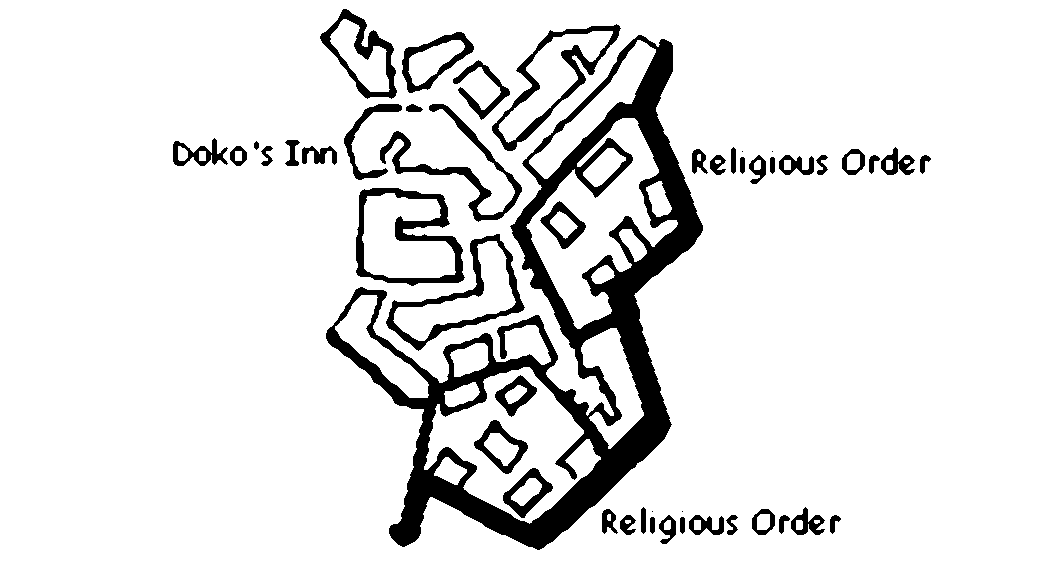
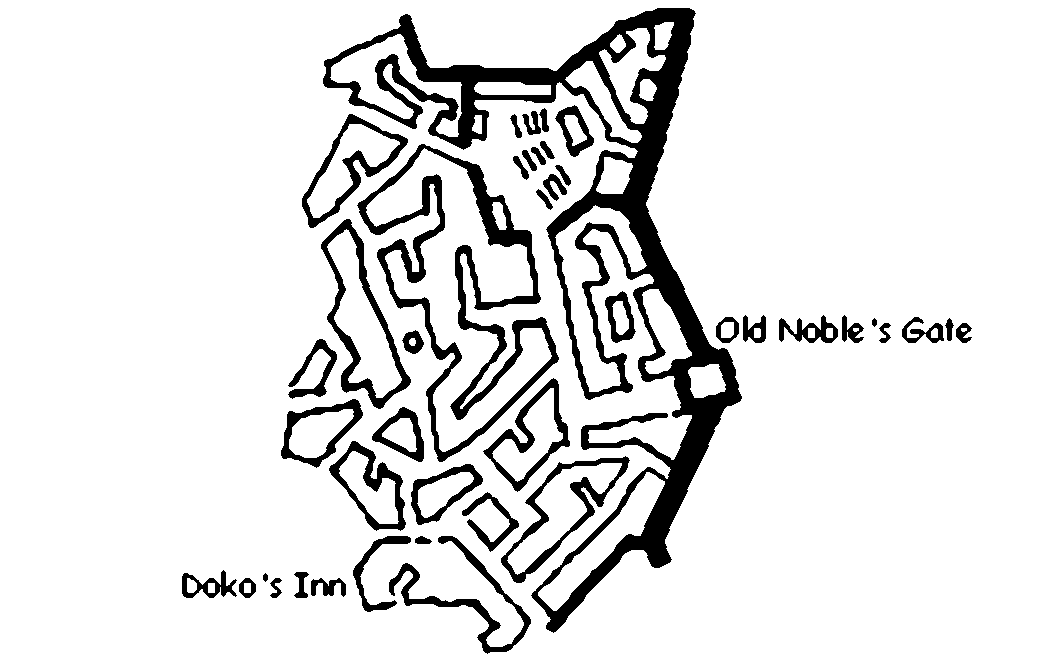
NEBADOR Book One: The Test 22
On the third day, exploring far into the southeastern corner of the city, Ilika was struck by the stillness and quiet. Unlike every other place in the city, these streets were nearly deserted, with no laughter of children nor music of any sort.
He passed houses of the rich, silent as tombs, then came upon a heavy wooden gate set in a stone wall. A metal plaque showed it to be a religious order. With a thoughtful expression, he wandered on.
Soon he passed a headstone sculptor, a coffin maker, another religious order, and the Advocate’s Guild with lawyers ready to make wills or manage estates. The gloominess of the area caused his shoulders to slump and his feet to drag.
When another rainstorm began to wash the city, he looked up at the sky, whispered, “Thank you,” then happily spent the rest of the afternoon back in the common room of Doko’s Inn, sipping warm tea and pondering what he had learned.
NEBADOR Book One: The Test 23
On his fourth day in Cobble Town, after a light morning rain and a bowl of soup, Ilika was slowly walking northward near the eastern edge of the city.
The afternoon was passing slowly as his feet carried him from street to street while he glanced at guild halls and anything else that piqued his interest. As the sun came out and the wet streets began to dry, the rising vapors created an eerie feeling of unreality throughout the city.
Suddenly he heard shouting somewhere ahead that snapped him back to full attention. Some of the people around him on the street continued walking toward the sound, apparently anxious to get there, while others were moving casually away. After a deep breath, he walked on.
The street ended at a small open square. Guards on both sides of the entrance watched people coming from the square, but not those entering. The space was like a theater, with many benches and an elevated platform similar to a stage. Ilika entered the open area behind the benches and looked around.
A young girl, maybe five years old, stood on the auction block wearing a ragged burlap sack. Tears stained her face, but she stood silently with downcast eyes. The auctioneer shouted about the good housekeeper she would make, and the bidding was opened at one small silver piece. Even though the man coaxed and goaded his audience, she finally sold for only three small silvers. The buyer grumbled about the cost of feeding her as he came up to claim his purchase.
Ilika, nearly white, staggered back out of the square. One of the guards made a jest as he passed, something about a missing portion of Ilika’s anatomy, but he wasn’t paying attention. Soon he found a bench and nearly fell onto it, closed his eyes, and breathed slowly.
Ilika could still hear the auctioneer. In contrast to the little girl, a healthy grown man caused heavy bidding and brought between five and ten small gold pieces. A lad of about twelve or thirteen went for three small gold. Obvious health problems generated little interest, but females would sometimes command a high value.
After Ilika regained his color, and the shaking in his knees passed, he dragged himself slowly back through the streets of Cobble Town toward the plaza and the comfort of his room at the inn.
NEBADOR Book One: The Test 24
That evening, Ilika discovered that Mosa, the innkeeper’s wife, made a pot of stew every day, of small beans and root vegetables, for use when the meat ran out. A slight smile came to him for the first time in several hours.
Without being asked, Mosa sent her daughter to the market for fresh juice.
He gave a copper to the matron and another to the girl, who glowed with happiness and ran off to stash away her prize.
Ilika watched and listened to the other guests as he dipped bread into the savory stew and sipped his tangy fruit juice. A moment of sadness passed over him when he saw blood oozing from a large piece of red meat at the next table.
After praising Mosa on her stew, he strolled into the marketplace where most stands and carts were packing up for the day. The bakery was sold out of bread, but still had some pies and tarts, and the baker himself was tending the counter while preparing to close.
“Loki!” the baker said in greeting.
Ilika smiled. “A berry tart, please, Tori,” he said, sliding over a copper coin. When four tarts appeared, he chuckled.
The baker shrugged. “A copper buys a lot at closing time.”
“Please, give the others to some children. I just ate dinner.”
Without pause, Tori whistled and shouted a pair of names toward the market. Two young peasant girls, helping to load a cart, came running over.
“Ye’sir? Ye’sir?”
“Take a tart each, and one to your brother.”
“Ye’sir, tank’u sir!”
Ilika nibbled at his dessert while watching the drama that turned out much better than his own act of kindness a few days earlier. Then he suddenly looked at the baker, busy brushing out his oven, and a sparkle of understanding came to his eyes. “Tori, if I wanted to hire some . . . smart people,” he asked, choosing his words carefully, “where should I go?”
“Depends. Street smarts or book smarts?”
Ilika was silent for a moment, his mouth twisted in thought. “That’s a very good question. Mostly street smarts, I think, but also the ability to . . . um . . .
learn new things, and . . .” For a moment he was at a loss for words. “And
NEBADOR Book One: The Test 25
inner strength.”
Tori nodded. “How old?”
“Fairly young and adaptable, maybe . . . fifteen to twenty?”
The baker was silent as he considered the question while scraping his kneading board. “Hmm . . . maybe . . . no. Maybe the religious orders.
Probably not the college.”
“College?” Ilika prodded with interest.
“There’s a school for rich kids over by the Jeweler’s Guild, but I don’t think they’re what you want.”
“Oh. Thank you very much. I guess I should go talk to the religious orders.”
“Good luck. That’s a rare thing you’re looking for.”
“Yes, I know,” the younger man replied, and left another copper piece on the counter.
Deep Learning Notes
While exploring Cobble Town, Ilika seemed uninterested in the shops, but enjoyed the musicians and jesters. What does this tell us about him? What would YOU most enjoy in a medieval city?
A small map shows the area to the east of Doko’s Inn where Ilika began his exploration of Cobble Town.
Why did Ilika look askance at the surgical instruments in the healers’
windows?
A small map shows the extreme southeastern corner of the city, where Ilika found religious orders and businesses related to religious ceremonies such as funerals.
Ilika said “Thank you” to the sky when rain started falling. There are several possible explanations for this, all of which make him unusual by our
NEBADOR Book One: The Test 26
standards. Who or what do you think he was talking to?
A small map shows most of the northeastern corner of the city where Ilika stumbled into the slave market.
A general society is one that has to find a place for every sort of person who is born, including those who can’t function because of handicaps, low intelligence, or anti-social behaviors. (In contrast, a select society, like a business, has the option of tossing people “out.”) Slavery is one of the ways general societies have invented to deal with people who can’t function adequately, and has the advantage of being highly profitable for the slave owners and traders.
Why was the baker able to give free tarts to the children with much greater success than Ilika a few days earlier?
What role did the baker begin to play that allowed Ilika to learn of the college and decide to visit the religious orders?
NEBADOR Book One: The Test 27








